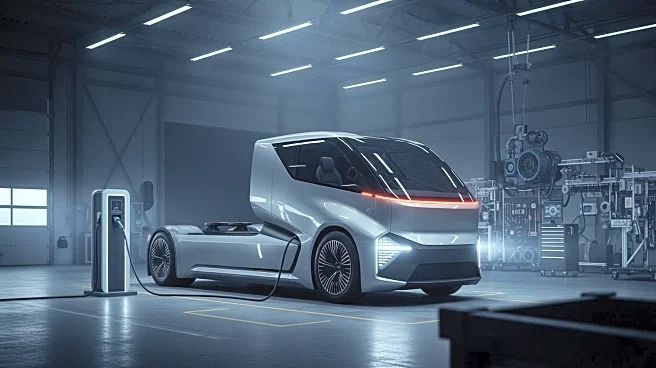What's Happening?
Executives at Ford are reportedly discussing the possibility of discontinuing the F-150 Lightning, the company's flagship electric pickup truck. This consideration follows Ford's decision in late October
to pause production of the F-150 Lightning to focus on hybrid and gas-engine versions of the popular pickup. The production halt was influenced by a fire at the aluminum supplier Novelis' factory in Oswego, New York, earlier this year, which has contributed to ongoing production difficulties. The F-150 Lightning, introduced in 2021 with an initial base price of $40,000, began production and sales in 2022. Despite being one of the top-selling electric trucks in the U.S., Ford has faced challenges in selling more than a few thousand units per quarter.
Why It's Important?
The potential discontinuation of the F-150 Lightning highlights the challenges automakers face in the electric vehicle market, particularly in the truck segment. Ford's struggles with the F-150 Lightning reflect broader industry issues, including supply chain disruptions and changing regulatory environments. The decision to focus on hybrid and gas-engine models suggests a strategic pivot in response to market demands and production realities. This move could impact Ford's position in the electric vehicle market and influence other automakers' strategies. Additionally, the end of federal EV tax credits and changes in emissions regulations under the Trump administration have further complicated the landscape for electric vehicles, potentially affecting consumer adoption and industry growth.
What's Next?
If Ford decides to discontinue the F-150 Lightning, it may shift resources to enhance its hybrid and gas-engine offerings, potentially leading to new model developments or updates. The decision could also prompt Ford to reassess its overall electric vehicle strategy, possibly exploring new partnerships or technologies to overcome current challenges. Industry observers and competitors will likely monitor Ford's next steps closely, as they could signal broader trends in the automotive sector's approach to electrification. Stakeholders, including investors and environmental advocates, may react to Ford's decision, influencing future policy discussions and market dynamics.









